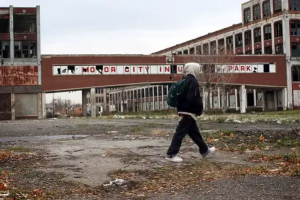Deindustrialization refers to the sharp decline in the level of industrialization that began to occur in the United States in the late 70s and has accelerated since then, hitting Rust Belt states like Pennsylvania, Illinois, and Michigan the hardest. It's led the US economy to become dominated by the parasitical financial sector and the unproductive service sector in place of the physical economy.
Areas impacted by deindustrialization have been decimated, with signs of social decay evident to anyone. Wages have lowered even for those jobs that have remained, and many non-manufacturing businesses have closed alongside the factories. This has led many young people to leave altogether due to a lack of jobs. The most egregious example of social decay is the extreme prevalence of opiate addiction. These de-industrialized areas were seen as easy pickings and were purposefully targeted by the Sackler family, leading to mass death and misery that was almost completely ignored by the media until Donald Trump brought attention to it during the 2016 election.
These areas contributed significantly to the MAGA insurgency against the uniparty globalists who destroyed the American economy, attracted in large part by Trump's promise to bring jobs back to the US. He only enjoyed very limited success in his first term, and while we'll have to see how he'll do in his second term, any large scale re-industrialization is unlikely due to the overwhelming attraction that cheap labor and lax regulation in third world countries have for corporations. The Cassandra Ross Perot spoke about this process in 1992: https://www.youtube.com/watch?v=VRr60nmDyu4
